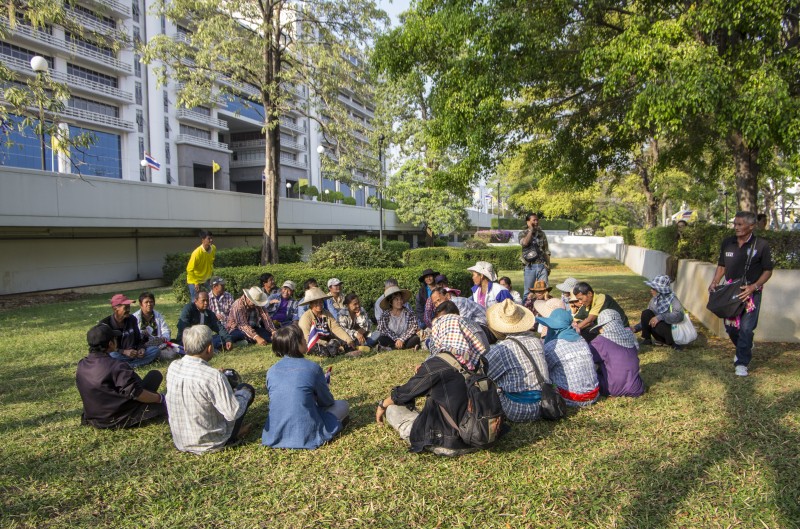
Protesting farmers in front of the Ministry of Commerce in Bangkok. Photo by Karnt Thassanaphak, Copyright@Demotix (2/6/2014)
Introduced in 2011 after the election victory of Prime Minister Yingluck Shinawatra, the program involved the government buying the rice output of local farmers at high a price before reselling the rice to the global market. The program was meant to improve the savings of farmers.
For five decades, Thailand was the world’s largest rice exporter but it has been overtaken by India and Vietnam in recent years. Critics blame the rice pledging program for the huge financial losses in the rice sector.
The rice protest has intensified the country’s political crisis as anti-government protests continue to gather thousands in the streets of Bangkok.
Majority of farmer-protesters are not affiliated with the People's Democratic Reform Committee which has been the lead organizer of the anti-government protests. In fact, many farmers are from the village strongholds of the ruling party.
The opposition has expressed support to the protesting farmers and has initiated a donation campaign to help sustain the protest in the city. The opposition is also blaming corruption under the Yingluck government for the present suffering of rice farmers.
For its part, the government said it was unable to pay farmers because of the protests which caused the dissolution of the parliament. It urged protesters not to block or occupy government banks.
It assured farmers that the government is finding a mechanism on how to deliver the payments. It also rejected criticism that the rice subsidy program has become a disastrous populist policy:
Ultimate goal of the rice pledging scheme is not the Government’s popularity, but simply the upgrade of income security for the better lives of farmers, and for the better future of our posterity since rice farming means growing the better future on our own land without any impact to the country’s monetary and fiscal disciplines.
But Bangkok Pundit believes a new subsidy program should be implemented by the government:
…some other form of subsidy which doesn’t involve the government being in the business of selling rice is a better option. A direct subsidy of something similar would be a much easier scheme to implement and manage. You can set a budget and you wouldn’t have to go through the problems the government is facing now with trying to issue bonds and who to borrow the money from.
Below are some photos and reaction on Twitter. In this photo, farmers mounted a street blockade near Bangkok, the country's capital.
How many Thai rice farmers does it take to blockade key transportation arteries? Not many.
http://t.co/wMu7XMPFLm pic.twitter.com/Hrnjinfqgt
— Andrew Clark (@qandrew) February 6, 2014
Bangkok protesters showed solidarity to the farmers by gathering cash donations:
Protesters donating money to help rice farmers, many of whom have not been paid by govt. since Oct. 2013 pic.twitter.com/RzLRTb8I7O
— teamkorn (@teamkorn) February 7, 2014
@PravitR thinks the Prime Minister should immediately apologize to farmers:
Yingluck should meet affected rice farmers right away & apologize instead of playing hide & seek with PDRC. #Thailand #Yingluck
— Pravit Rojanaphruk (@PravitR) February 5, 2014
This morning I am praying for #rice #farmers that they be paid fairly for all their hard work.
— Stewart Perry (@bangkokpastor) February 5, 2014
Personally think YL govt politicized rice issue2 by blaming late payment solely on protest pressure on banks, ignored own failure 2sell rice
— Waan Chomchuen (@waanspeaking) February 7, 2014







6 comments